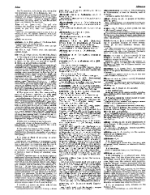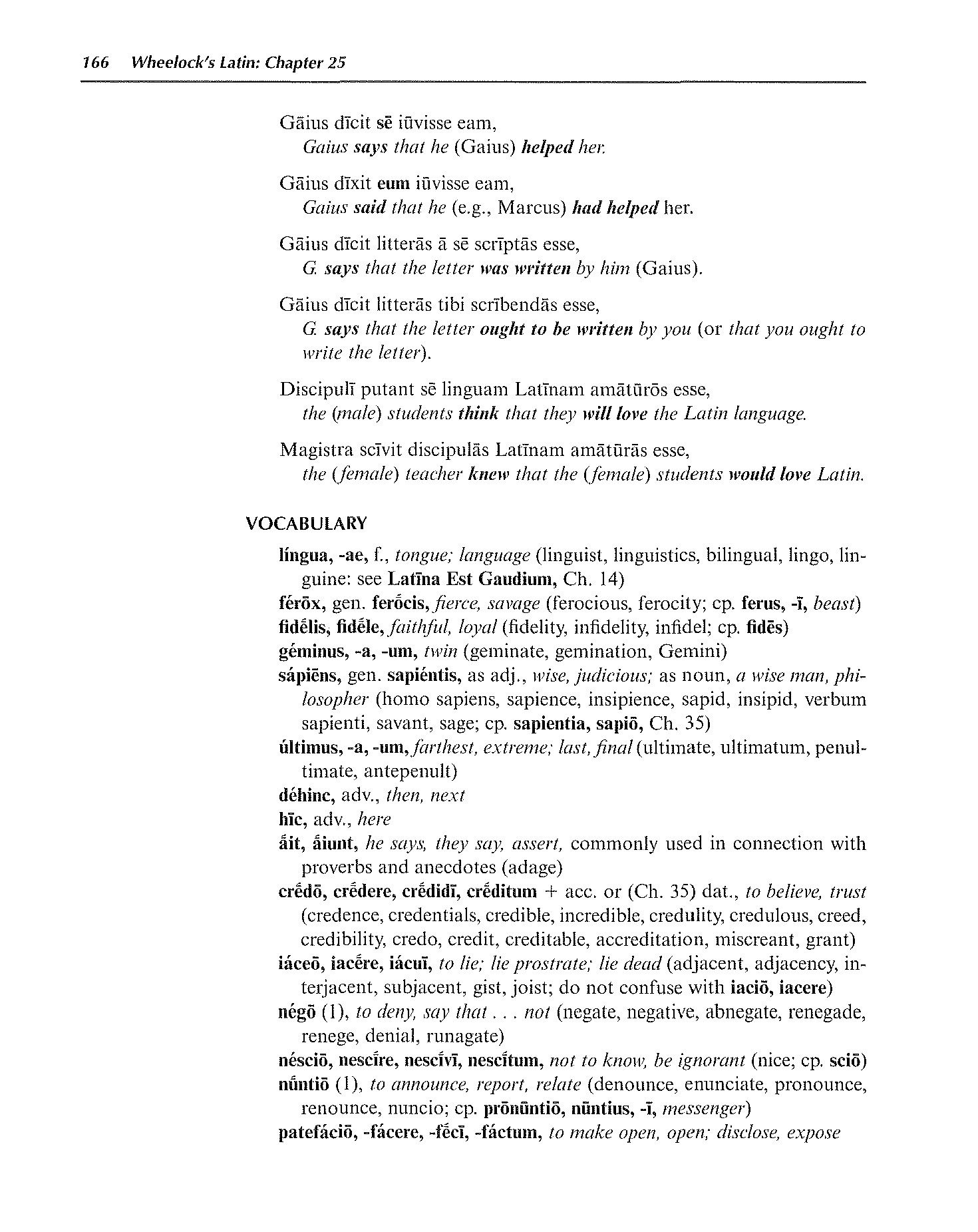
page_listing.tpl
page_subListingDetails.tpl
sub_listingDetails_style1.tpl
sub_listingDetails.title.tpl
āiere to assert
āiere is a Latin Verb that primarily means to assert.
Definitions for āiere
Wheelock's Latin
Verb
- 1
he says, they say, assert
- 2
commonly used in connection with proverbs and anecdotes (adage)
Oxford Latin Dictionary
Verb
- 1
[Umb. aiu, Gk. ἠμί, Arm. asem] FORMS AND PROS.: the following forms are found: pres. ind. āiō or aiio (both disyll.), ais (āis Pl. Poen.985), ait, āiunt or aiiunt; āīn or āin (PL. Mos.383, etc.) for aisne.
- 2
To say yes, say so. (b) ~o (as the answer to a question) so I say, yes; non ~o, no. (c) to consent, agree.
- 3
~n? (form of interrogation expr. doubt, surprise, etc.) what's that? Indeed! so! you don't say!
- 4
(w. acc.) To affirm, assert, say. (b) (w. acc. and inf.) to affirm (that). (c) (w. inf.) to order, tell (to).
- 5
(w. ut, also quemadmodum, quod) As he, etc., says. (b) (w. indef. subj.).
Sentences with āiere
Latin to English
Iam mala finissem leto, sed credula vitam spes fovet et fore cras semper ait melius.Compare I would by now have ended my sufferings by death, but gullible hope encourages me to live, keeps saying that tomorrow will be better.
Insanam autem esse aiunt quia atrox incerta instabilisque sit; caecam ob eam rem esse iterant quia nil cernat quo sese adplicet; brutam quia dignum atque indignum nequeat internoscere.Compare Foolish, they say because she is cruel, uncertain, fickle; blind, because she does not see whither she goes; stupid because she cannot distinguish between the deserving and the undeserving.
Argentariis male credi qui aiunt, nugas praedicant. Nam et bene et male credi dico: id adeo hodie expertus sum. Non male creditur qui numquam reddunt, sed prorsum perit.Compare People that say bankers are ill trusted talk rubbish. Why, they are well trusted and ill trusted both, I tell you - and what is more, I have proved it myself this very day. Money is not ill trusted to men that never repay you; it is gone for good.
Aiunt fertiles in Oceano iacere terras ultraque Oceanum rursus alia litora, alium nasci orbem... Facile ista finguntur, quia Oceanus navigari non potest. [Suasoriae,I.1.1]Compare They say that there are fertile lands somewhere in the Ocean, and that beyond the Ocean lie other shores, another world begins.... It is easy to imagine such things, for the Ocean is not navigable.
Conjugation table for āiere
Cactus2000
| ACTIVE | |
| Indicative present | Indicative imperfect |
| āiō āis āit - - āiunt | āiēbam āiēbās āiēbat āiēbāmus āiēbātis āiēbant |
| Indicative perfect | Indicative pluperfect |
| - āistī āit - - - | - - - - - - |
| Indicative future | Indicative future perfect |
| - - - - - - | - - - - - - |
| Subjunctive present | Subjunctive imperfect |
| āiam āiās āiat - - āiant | - - - - - - |
| Subjunctive perfect | Subjunctive pluperfect |
| - - - - - - | - - - - - - |
Infinitive present āiere Infinitive perfect - Infinitive future - | Imperative present āi - Imperative future - - - - |
| ACTIVE | |
| Indicative present | Indicative imperfect |
| āiō āis āit - - āiunt | āiēbam āiēbās āiēbat āiēbāmus āiēbātis āiēbant |
| Indicative perfect | Indicative pluperfect |
| - āistī āit - - - | - - - - - - |
| Indicative future | Indicative future perfect |
| - - - - - - | - - - - - - |
| Subjunctive present | Subjunctive imperfect |
| āiam āiās āiat - - āiant | - - - - - - |
| Subjunctive perfect | Subjunctive pluperfect |
| - - - - - - | - - - - - - |
Infinitive present āiere Infinitive perfect - Infinitive future - | Imperative present āi - Imperative future - - - - |
| ACTIVE | |
| Indicative present | Indicative imperfect |
| āiō āis āit - - āiunt | āiēbam āiēbās āiēbat āiēbāmus āiēbātis āiēbant |
| Indicative perfect | Indicative pluperfect |
| - āistī āit - - - | - - - - - - |
| Indicative future | Indicative future perfect |
| - - - - - - | - - - - - - |
| Subjunctive present | Subjunctive imperfect |
| āiam āiās āiat - - āiant | - - - - - - |
| Subjunctive perfect | Subjunctive pluperfect |
| - - - - - - | - - - - - - |
Infinitive present āiere Infinitive perfect - Infinitive future - | Imperative present āi - Imperative future - - - - |
Data sources
Notes
- Definitions
- Frederick M. Wheelock, Wheelock's Latin, 6th ed., rev. Richard A. LaFleur (New York, NY: HarperCollins Publishers, 2005): 166.
- P. G. W. Glare, Oxford Latin Dictionary, Vols. 1-8 (Oxford: Clarendon Press, 1982): 91.
- Word frequencies
- Christopher Francese, "Latin Core Vocabulary," Dickinson College Commentaries, last modified 2014, http://dcc.dickinson.edu.
- Paul B. Diederich, The Frequency of Latin Words and Their Endings, PhD diss., (Columbia University, 1939).
- Louis Delatte, Suzanne Govaerts, Joseph Denooz, and Etienne Evrard, Dictionnaire fréquentiel et index inverse de la langue latine [Frequency Dictionary and Inverse Index of the Latin Language] (Liège, Belgium: Laboratoire d'analyse statistique des langues anciennes de l'Université de Liège [L.A.S.L.A.], 1981): 121.
Bibliography
Allen, Joseph H. Allen and Greenough's New Latin Grammar for Schools and Colleges: Founded on Comparative Grammar. Edited by James B. Greenough, George L. Kittredge, Albert A. Howard, and Benjamin L. D'Ooge. Boston, MA: Ginn & Company, 1903.
Crystal, David. A Dictionary of Linguistics and Phonetics. 6th ed. Oxford, UK: Blackwell Publishing, 2008.
Delatte, Louis, Suzanne Govaerts, Joseph Denooz, and Etienne Evrard. Dictionnaire fréquentiel et index inverse de la langue latine [Frequency Dictionary and Inverse Index of the Latin Language]. Liège, Belgium: Laboratoire d'analyse statistique des langues anciennes de l'Université de Liège (L.A.S.L.A.), 1981.
Diederich, Paul B. The Frequency of Latin Words and Their Endings. PhD diss., Columbia University, 1939.
Francese, Christopher. "Latin Core Vocabulary." Dickinson College Commentaries. Last modified 2014. http://dcc.dickinson.edu/latin-vocabulary-list.
Gildersleeve, Basil L., and Gonzales Lodge. Gildersleeve's Latin Grammar: Third Edition, Revised, and Enlarged. 3rd ed. London, England: Macmillan and Co., 1903.
Glare, Peter G.W. Oxford Latin Dictionary. Vols. 1-8. Oxford, England: Clarendon Press, 1982.
Krüger, Bernd. "Latin Conjugation Tables." Cactus2000. Accessed May 5, 2023. https://latin.cactus2000.de/index.en.php.
Pierson, Nick. "Sound of Text." Accessed October 26, 2019. https://soundoftext.com.
Wheelock, Frederick M. Wheelock's Latin. 6th ed. Revised by Richard A. LaFleur. New York, NY: HarperCollins Publishers, 2005.
Wiktionary Contributors. "Victionarium." Wikimedia Foundation, Inc. Updated March 18, 2019. https://la.wiktionary.org/wiki/Victionarium:Pagina_prima.
Citation
Chicago (17th ed.)
Allo Contributors. "āit, āiunt (v.) - Latin Word Definition." Allo Latin Dictionary. Last modified . Accessed February 20, 2026. http://ancientlanguages.org/latin/dictionary/ait-aiunt.
Entry created on . Last updated on .








